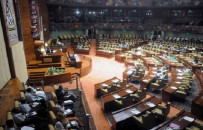Wildlife conservation day: Pakistan is losing ecosystems at an alarming rate, say experts
Due to many malpractices, numerous native species of plants and animals are in decline.

Pakistan is losing its rangelands, forests, freshwaters and marine ecosystems at an alarming rate and measures are needed to address the situation immediately. PHOTO: FILE
Pakistan is losing its rangelands, forests, freshwaters and marine ecosystems at an alarming rate and measures are needed to address the situation immediately.
This was the consensus among speakers at the World Wildlife Conservation Day celebration held at the Pakistan Museum of Natural History (PMNH) here on Monday.
The event was jointly organised by the Ministry of Science and Technology, PMNH, the US Embassy and the Snow Leopard Foundation (SLF).
Former Quaid-i-Azam University vice chancellor Prof Dr Qasim Jan was the chief guest.
US Embassy Minister Counsellor for Public Affairs Peter Brennan, Forests IG Mahmood Nasir, PMNH Director-General Muhammad Akhter Javed, SLF Director Dr Muhammad Ali Nawaz, US Embassy English Programme Manager Abdul Majeed, and PMNH Zoological Sciences Division Director Dr Muhammad Rafique were also present.
Dr Jan said that the country has long coastal areas, deserts, network of rivers, canals, lakes, plains, variety of forests, mountains, glaciers, pasture lands and some of the highest peaks in the world, providing numerous habitats and ecological systems for faunal and floral species.
He said that due to anthropogenic activities, wildlife populations have declined dramatically in Pakistan in the last three to four decades as natural habitats were continuously being fragmented and degraded.
He said it was feared that Pakistan was experiencing the worlds’ second-highest rate of deforestation and was losing its rangelands, forests, freshwaters and marine ecosystems at an alarming rate.
It is also facing the menace of climate change, uncontrolled emission of greenhouse gases, increase in human population, urbanisation, unsustainable agricultural practices, encroachments, hunting, poaching, introduction of exotic species and weak implementation of wildlife rules and regulations.
“As a result of all these malpractices, we are facing a decline in numerous native species of plants and animals. A number of them are already extinct and many are listed as threatened in Pakistan,” he said.
He said that “we have many challenges to face and many questions to ask to ourselves regarding emerging environmental issues”. “We have to think how we will increase food productivity over the next 50 years and how we will reduce carbon emissions without hampering industrial and economic growth.
“How can we reduce the impact of invasive species that are moving around in an increasingly globalised world? How can we create effective governance mechanisms and greater awareness about the link between people and nature? How can we leverage new technologies to improve the exchange of information for conservation?
How can we protect the species and ecosystems to make sure they are around for future generations? These are the questions and challenges that we need to address, he said.
A statement on behalf of PSF Chairman Prof Dr Khalil Ahmed Ibupoto was also read out. “Wildlife maintains an ecological balance and the organisms have their unique positions in food chains, which keep the ecological balance. It contributes to the maintenance of material cycles such as carbon and nitrogen cycles.”
Peter Brennan talked about animal trafficking and US efforts to control it. He said that the future of “your country depends on the future of your animals and plants”.
Published in The Express Tribune, March 4th, 2014.



















COMMENTS
Comments are moderated and generally will be posted if they are on-topic and not abusive.
For more information, please see our Comments FAQ